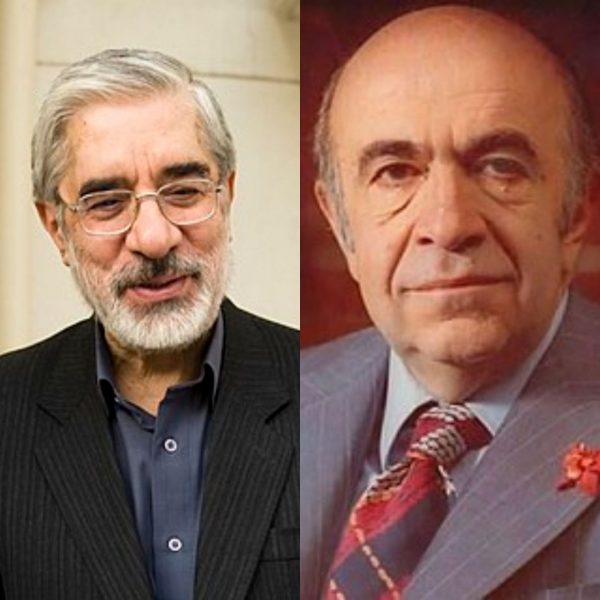From the Exoneration of Hoveyda to the Forced Confession of Mir-Hossein Mousavi
The distance from Hoveyda to Mir-Hossein is not vast; both became prime ministers a few years apart but under two different regimes. Their fates also became similar as both fell out of favor and ended up in prison and house arrest. The Shah imprisoned Hoveyda, who was no longer prime minister, shortly before leaving the country, and Mir-Hossein was placed under house arrest 20 years after his premiership ended.
The accusations against Hoveyda resemble those that his supporters and critics of the Islamic Republic levy against Mir-Hossein Mousavi. Why does the opposition abroad, especially the monarchist faction, harbor such animosity towards Mir-Hossein Mousavi and attack him? Are the accusations they list against him genuine and fair?
Why do they hold him so responsible and effective in the policies of the Islamic Republic, even after more than 30 years since his premiership, while he has been under house arrest for years and has recently made the harshest attacks on power? Aside from the specific idea that the opposition sees him as a rival and tends to be hostile towards any figure they perceive as a competitor, it seems they are caught in a double standard in their political maneuvering. Essentially, anything that contradicts their interests, not necessarily truth and fairness, is met with insults and excommunication.
Double Standard
The double standard of the opposition abroad in dealing with Mir-Hossein Mousavi lies in the fact that they exonerate the Shah’s prime minister for similar accusations while deeming Ayatollah Khomeini’s prime minister guilty. None of them have ever slightly criticized the Shah for imprisoning Hoveyda, suggesting that if he hadn’t been imprisoned, he might not have met such a painful fate.
Besides, they attribute no role or share to Hoveyda, rightly or wrongly, in the policy-making and erroneous decisions of the previous system or regime and the Shah. They fully accept his statements or claims of being merely a cog in a wheel or an agent of the Shah’s orders.
They accept Hoveyda’s claim, rightly or wrongly, that he had no knowledge or role in the plans and actions of SAVAK, but when it comes to Mir-Hossein, they are unwilling to apply the same logic. Hoveyda was known as the powerless prime minister, and he seemed not averse to presenting this image of himself in court, even if it was to escape the death sentence. However, supporters of the monarchy prefer to remain silent on this matter, pretending not to hear or see, as acknowledging it would force them to admit that the Shah was an undemocratic absolute power.
In court, Hoveyda, rightly or wrongly, stated that the system was like that, and he did not create it. There were prime ministers before and after him who worked with this system, and he was merely a continuation, not the creator. He claimed to have no knowledge of SAVAK’s activities, although the head of SAVAK was his deputy but neither took orders from him nor reported activities to him.
From SAVAK to the Judiciary
However, the prosecutor in Hoveyda’s trial, rightly or wrongly, believed that Mr. Hoveyda, you said similar things in the previous session and blamed the system. The court is not trying you but the system you represent and execute. In that system, the nation was ignored, the country was under foreign influence, and SAVAK tortured and killed young people and activists in horrific ways.
Briefly, do you think this system was right for you to continue with it? The opposition abroad has similarly positioned Mousavi, under house arrest, as a defendant in such a court and seeks to extract forced confessions from him. The opponents abroad of Mousavi should judge their own stance.
If the Shah’s prime minister truly was, as he claimed, a powerless pawn unaware of SAVAK’s actions, why should Ayatollah Khomeini’s prime minister not be? With the difference being that at least the head of SAVAK was Hoveyda’s deputy, while Iran’s judiciary was entirely independent of the executive and the prime minister’s office. In a structure where the McFarlane negotiations, related to the government, were conducted out of the prime minister’s sight, why should judicial decisions have been reported to him?
The revolutionary court demands that Hoveyda answer for SAVAK’s actions, even though Hoveyda claims he was also detained by SAVAK and imprisoned. If I live long enough, I will write a book about my tenure from September 1941 to my last day in office.
Now, the opposition abroad also wants Mousavi to answer for the actions of a structure that has placed him under house arrest. Hoveyda wanted to write his responses in his memoirs but did not get the chance. Hopefully, Mir-Hossein will have that opportunity.

